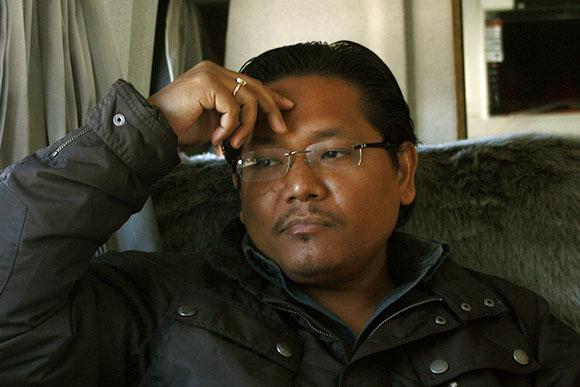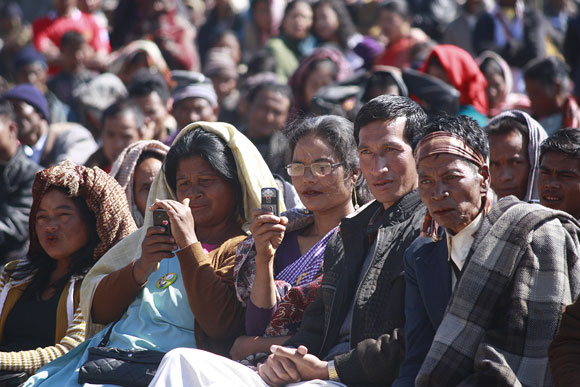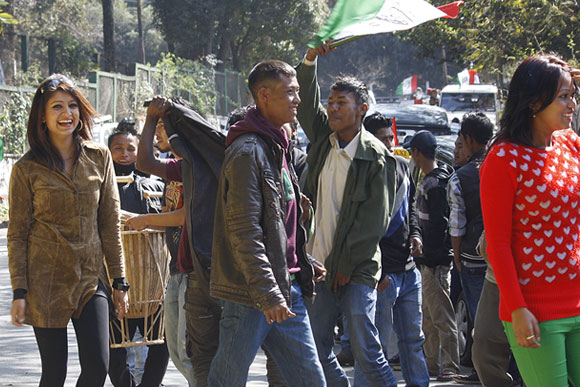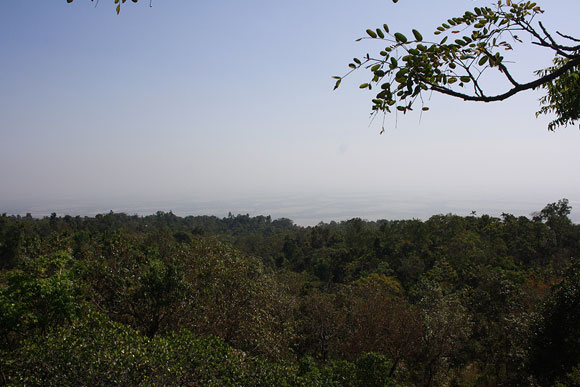
Conrad Sangma, 35, Leader of the Opposition in the outgoing Meghalaya assembly that goes to the polls on Saturday, explains to Rediff.com's Archana Masih the need for a fresh approach to solve the problem of insurgency in the state, the reasons for the lack of women in state politics and the need for cultural exchanges between the North-East and the rest of India.
In a state when some extremist group or the other calls for a bandh on Republic Day and Independence Day, it is hardly surprising that on the eve of the Meghalaya assembly election, the banned Hynniewtrep National Liberation Council, has called for a bandh on polling day on February 23.
Conrad Sangma, 35, the Leader of the Opposition in the outgoing assembly, tells Rediff.com's Archana Masih that the state government needs to do much more in engaging with insurgent groups.
On the way to an election meeting last week, he spoke about the reasons for Meghalaya's political instability, his disappointment that not a single women candidate applied for a ticket to contest the election from his party and what can be done to bridge the divide between the North-East and the rest of India.
Why has Meghalaya had such political instability since its creation in 1972 that only one chief minister has been able to complete his full term?
The main reason is the way this state is carved out. A lot of regional aspects are there so a lot of sentiment comes into play which creates a lack of consensus in leadership.
If a consensus would have been there in leadership then such a problem wouldn't have happened.
I am hoping this will change with more awareness and education because of instability we have lack of policy making and development process. I hope this will lead people to think that they should give one party a chance.
I still think it'll take some time till we reach that level and for that we need a strong leadership to show the way.
What are the reasons for the high school dropout rates and unemployment that results in so many young people going outside the state, seeking jobs?
Our population of young people below 15 is very high compared to other states which poses a lot of challenges in terms of education infrastructure. The dropout rate is very high, especially at the village level.
The youth go out because there are no opportunities here. The youth policy and employment generation is not very focused and systematic.
Tourism has a lot of potential here, but just putting a viewpoint and toilets and thinking this is tourism development is not all, we need a whole policy. The youth issues are dependent on employment generation.
Our delivery mechanism and accountability in the state is very weak. Hardly do MLAs, ministers take interest in block level-district level work. Those caught doing the wrong thing should be made responsible for what they do.
Please ...

It seems a paradox that in spite of a matrilineal system, there are hardly any women in state politics. The last assembly had only one female MLA!
You may think that we didn't field any women candidates, but nobody applied! There was not a single woman applicant.
Basically, women are not participating in political activity, but having said that women are very powerful in our society and may feel that they don't need to be in politics to feel that power.
Women NGOs are very strong in our state. We don't need to look at empowerment only in the political sense but more holistically. I hope in the long run, we will see more women in politics.
There are more women candidates this time than last time, but that's not enough.
There continues to be this big divide between the North-East and the rest of India, which took the most unfortunate turn last year after the riots in Assam resulted in many young people fleeing other parts of India and returning home.
Why does this sense of alienation of the North-East still exist?
This alienation has been there for a long time. There have been many cases where people from the North-East have been looked down upon because most of our people don't speak Hindi and our cultural background is slightly different.
I think that's something of being part of such a diverse country like India. It is painful to see this discrimination and I hope in the long run it will smoothen out.
The Government of India and the state government should take an active role in seeing that there are more exchange programmes and cultural mixes. The situation is slowly improving, but still there are precedents which are very disturbing.
Please ...

Do you think it would have been better if your father P A Sangma, who was one of the front-ranking leaders of the Congress party, had not left the party?
He did not leave. He was expelled without any show-cause notice. Obviously, he had no choice.
They did not agree on the foreign origin issue which Madam Sonia Gandhi also realised and allowed the process to continue with Dr (Manmohan) Singh and in the future with perhaps Mr Rahul Gandhi.
That aspect is over. Politically, how would that have turned out is difficult to say. He may have worked at a stronger position in the party, may have been a minister or in a seat of power, but Mr P A Sangma is a man of principle and does not do something his conscience does not allow.
He has no guilt in his heart. I don't know what position he might have been in -- I cannot say -- but I know he is a satisfied man overall.
Wouldn't being in a bigger party have been better for your political career?
There are merits of being in a bigger party, but at the same time there are demerits also. In a big party, you have access to a network, can connect to powerful people, respond to people's aspirations better. But it has its negatives too.
You get lost in a big organisation. There are times you never get a chance to meet the leader and there is so much lobbying taking place.
I am more cut out for an organisation that responds fast and connects with everybody. I use that word because it is very important, most of the time big leaders are unavailable.
In our organisation we are very quick to respond. So there are merits and demerits, you deal with the demerits and work with the merits.
Don't you have aspirations for a role at the Centre?
Actually since I have grown up in Delhi, I thought I would go to the Centre, but when I understood the grass-root situation in the state, I felt there was more work to be done here.
I feel connecting with the grass-roots is easier to do in the state. I also want to ensure that our organisation is stronger and delivers the development process to the people.
I feel in our system there are many broken pipes and a lot of leaks. These pipes have to be made more efficient.
It is too early to say if I will come to the Centre. Agatha (Sangma, his younger sister and the Lok Sabha MP from Tura) is doing a good job. I am focused on the state.
Please ...

Meghalaya and the North-East have seen persistent insurgencies which has hampered the region. What, according to you, is the way forward?
Insurgencies here is about sentiments involved which come from development aspects -- no roads, jobs, the feeling that nobody cares.
Then somebody comes along and says, 'Let's take up the cause.' That's how it starts.
Sometimes when the government and system don't respond in a correct manner -- in Manipur, I am against the Armed Forces Special Powers Act and condemn it.
The Manipur situation has become very extreme and a lot has to do with how AFSPA has been misused. That is what I mean when I say it depends on how the system responds.
I have been screaming in the assembly that we need a multi-pronged approach to solve the problem of insurgency. Insurgency has to be looked from a socio-political, economic point of view.
Jobs are a major issue.
Unless we look at it holistically, we will not be able to solve it. The problem is at the grassroot level and we have to work at that.
We will be able to resolve the issue. The gun is not the answer always.
You feel dialogue is the best way for a resolution?
The government has to try to bring them to the dialogue table. Our state government hasn't invited them for talks for months. The people in the area will know more about the insurgents than police intelligence.
Why don't you use the local people, the church, the elders to also talk to them. The government can take such an initiative. It is not easy no doubt, but the government should use all channels -- whether MLAs, local church leaders, and women's NGOs.
I feel all efforts are not being made.
It's complicated and we need a different approach to tackle this. So we have to open all the channels, otherwise we will not be able to resolve this problem.
It can't be resolved by the gun.
You have to talk, have economic development and do real work at the grass-root level.
They talk as if it's a war, it's not. We need a different approach.
What about Meghalaya's entrepreneurial capabilities? What have been some of the changes in that sphere?
Our state lacks entrepreneurs. People are more interested in becoming contractors. People should come into sectors like meat processing, fisheries, horticulture etc.
We are a small state with a border with Bangladesh. We always look at the disadvantages of it -- illegal immigration, security issues. Of course, we need to take care of that, but we can also take advantages.
We have a 450 km border with Bangladesh. We need to look at trade.
It takes four-and-a-half hours to reach Tura from Dhaka by road. We have a very huge potential in terms of tourism because there is no hill station in Bangladesh, the closest hill stations for them are Shillong, Tura, Garo Hills.
We also eat a lot of fish which we can get from there, we can send oranges from here.
We can take advantage of the border with Bangladesh.